Simon Amstell: How the comedian is peeling away the layers of shame
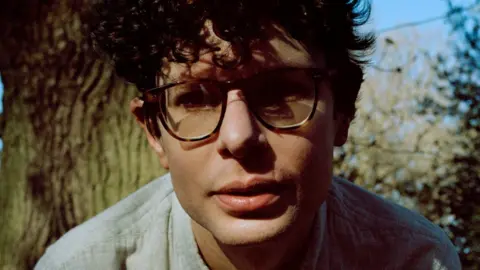 Harry Carr
Harry CarrSimon Amstell has been up to his old tricks again.
The comedian, who made his name in the Noughties poking fun at celebrities as the irreverent host of Popworld and Never Mind the Buzzcocks, told the Lorraine show last month that lockdown had been a terrible time due to all the "awful daytime TV".
Closing in on stand-in presenter Christine Lampard's other ITV programme, Loose Women, he then joked: "Do you remember when it was just white women? But now they've really figured it out." (Previous media reports highlighted the network's lack of diversity in its daytime programming.)
"It was a different time, wasn't it?" Amstell reflected sardonically. "It was a different time - 2016."
Having spent the last decade "quite intentionally" moving away from being that "cheeky monkey" while honing his craft, the 41-year-old admits it was satisfying to briefly reprise the role during the interview.
"As I've got older, I've got into doing much more stand-up, and much more writing and directing, and so there's been this shift towards stuff that to me feels more fulfilling and artistic and honest," he tells the BBC.
"And it occurred to me that, 'Maybe I'll be Popworld Simon for this interview!' It was really nice to be him again for five minutes. It was really fun and it felt quite scary to take the risk of being more than a bit cheeky on live television."
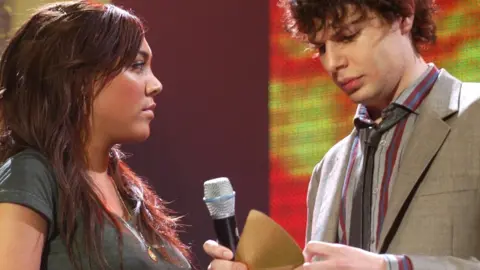 Getty Images
Getty ImagesYounger Simon's memorable on-air moments included asking a bewildered Britney Spears if she'd ever licked a battery, ridiculing Towers of London singer Donny Tourette's punk persona, and goading Preston from The Ordinary Boys by reading out extracts from his then wife Chantelle Houghton's book.
Some of it might be considered a little cruel by today's standards, but it would almost certainly be social media gold too.
His appearance on Lorraine, a rare TV chat show outing these days, was primarily to promote his upcoming stand-up tour, Spirit Hole, which picks from where his 2019 Netflix special, Set Free, left off.
Last time, viewers may recall, Amstell visited an Ayahuasca retreat in Peru in order to get to the bottom of his depression and the shame he had felt about his sexuality as a young gay man (he didn't come out until he was 21); and he was also at the centre of a drug-fuelled three-way kiss with his boyfriend and another man at a party.
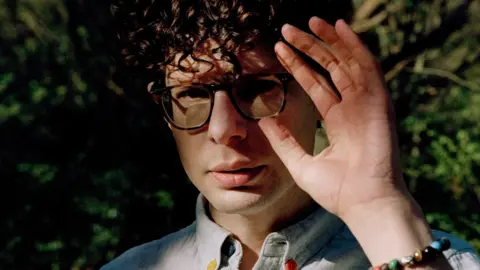 Harry Carr
Harry CarrThis time around, the kissing story gets upgraded to a full-blown sex club experience in Berlin (again alongside his longstanding boyfriend), he describes self-medicating magic mushrooms to help him handle lockdown, and, as the existential terror around growing older tightens its grip, he finds himself, pre-Covid, alone in New York with bleached blonde hair.
A return to see the shaman in South America sets him right again and sees Amstell dancing naked in the rainforest, having let go of his ego and any insecurities about his body, gender and sexual identity.
'Learned to surrender'
"I've been twice now to Peru to drink Ayahuasca, and it was handy that I visited just before the pandemic because I learned to surrender as well, and that was a vital tool once we were told we weren't allowed to leave our houses," Amstell laughs.
Ayahuasca is a psychoactive brew that is illegal in the UK and many experts say it is dangerous, while others have argued for it being researched as a potential treatment for mental health issues.
"It worked the first time: I went in there with depression and left having got to the root of that depression, [feeling] totally reset, reborn," he says.
"Then I started to feel all this anxiety around ageing and responsibility, and had that mini-crisis in New York. I felt the thing to do probably was to return to the place that made me better last time, and I did and it worked again."
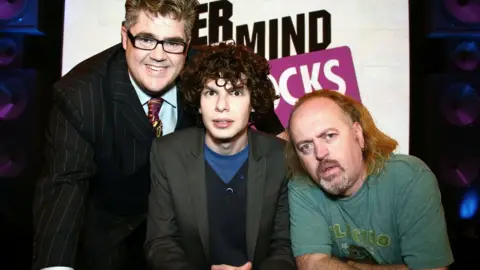
Acting on the the advice of a moody gorilla he spoke with during one hallucination in the Amazon, Amstell is now trying to "prioritise joy" in his life.
The former agent provocateur of the celebrity circuit - he wasn't asked back for Sky's reboot of Buzzcocks - sees his work these days as being part of a "journey towards healing" - one that begins with him "telling the truth on-stage in a funny way".
"I'm continuing to peel away all these layers of shame and finding more and more freedom and confidence and just being able to joyfully be my actual self, rather than worrying about what anyone thinks," he says.
"And the stand-up is really helpful in getting me there. By saying the thing that I'm most embarrassed about on stage, I end up witnessing the fact that it isn't a problem. People don't usually walk out, when I say the thing that I'm deeply ashamed of... There is this self and group acceptance that seems to happen."
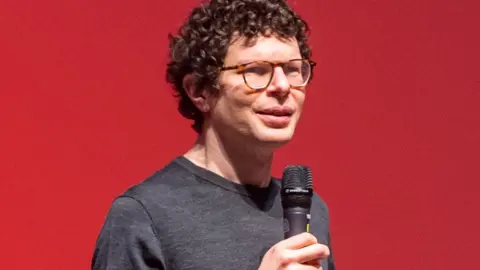 Getty Images
Getty ImagesBut does he ever regret being too honest in his shows? For example, the ecstatic poos he described in great poetic detail on his last tour.
"I never regret being honest," he replies. "The truth has set me free every single time. I just feel like I've shed a load of skin by the end of it, like I've evolved as a person and just become more and more like the toddler that I presume I used to be - wandering around all curious and silly."
'Have a chickpea!'
While not quite a toddler, Amstell - who grew up in a working class Jewish family on the Essex/London border - made his first TV appearance aged just 13, doing tricks and impressions of Dame Edna Everage.
He was "obsessed" with Eddie Izzard - though his own work is very different, he acknowledges - and his first stand-up performance came around the same time at a weekend stage school variety show.
After leaving school, he was sacked from his early presenting duties on the children's channel Nickelodeon for making pop stars feel uncomfortable. Which is ironic, given that that's how he would pay the bills several years later, influencing a raft of more mischievous TV hosts along the way.
The fame he found on Popworld and later Buzzcocks afforded him the chance to write and star as an exaggerated version of himself in his own BBC sitcom, Grandma's House, at the beginning of the 2010s.
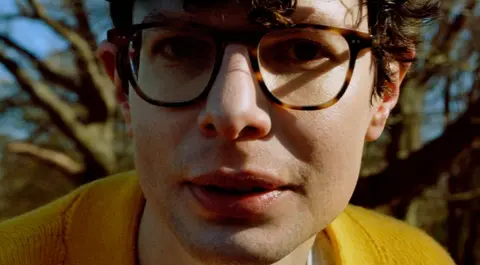 Harry Carr
Harry CarrThe TV funnyman then turned his hand to directing with the hilarious-yet-moving 2017 mockumentary Carnage, set in the future when the UK is totally vegan, on a plant-based diet, and dealing with the guilt of its blood-stained meat-eating past.
He's found some of the responses to the film, which also tackled the effects of the meat and dairy industries on climate change, to be encouraging but baffling.
"I went to a dinner party where the people in front of me were both saying they loved the film, whilst eating the leg of a chicken," he shrugs.
"There's very few things you can do as an individual because the problems are systemic. But If you want to do one thing to stop human beings from ceasing to exist, then have a chickpea!"
As long as he continues to exist, Amstell intends to write and perform his cathartic comedy every few years, while also working more behind the camera; as he did on the recent feature film Benjamin, about a young filmmaker who is terrified of intimacy.
Surrounded by sticky notes full of ideas, the entertainer and director says it would take him until the end of time to perfect either comedy or filmmaking but he'll give it a go.
What, we wonder, would the tricky young Simon have made of all this?
"He was very ambitious, that little 13-year-old," he says. "It would have been a real surprise to him if none of this has happened!
"For a while I was annoyed with his ambition because I felt like it meant that I'd spent my whole life working without any kind of balance.
"But I think he'd be really thrilled."

Simon Amstell's UK tour, Spirit Hole, runs from 8 September to 9 November 2021.
